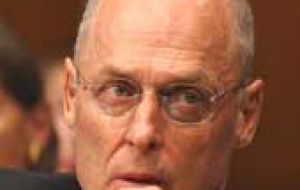MercoPress. South Atlantic News Agency
Paulson sees “long” confidence crisis in credit markets
 US Treasury Secretary Paulson
US Treasury Secretary Paulson The crisis of confidence in credit markets is likely to last longer than previous financial shocks of the past two decades warned United States Treasury Secretary Henry Paulson in an interview with the Financial Times.
Mr Paulson said the complexity and global distribution of the securities at the heart of the credit crisis would prolong it: "we expect this period of turbulence to go on for a while" and recalled that he had been investment banker at Goldman Sachs during the "Russian default, Asian crisis... and Latin American credit crisis" and expected this bout of uncertainty in credit markets was "going to take longer" to resolve. US authorities have advanced they expect that the uncertainty over valuing sub-prime mortgages could last for up to two years as many such loans reset to higher rates. Paulson said the likely duration of the turmoil reflected the difficulties of financial services companies in valuing complex assets tainted by mortgage-backed securities. "The reason it is going to take longer today [than in previous crises] is that we are more globalized," he said. US mortgages had been "sliced and diced" and were turning up at Landesbanken – state-run regional banks in Germany. "Secondly, it is the level of complexity," he said, adding that he had met daily with bankers trying to value asset-backed commercial paper and other products. "When they are confident they understand the products, confidence will return," he said. The European Central Bank on Wednesday loaned commercial banks 75bn (104bn) for three months, a sign that institutions in the money market remain wary of lending to each other for periods of more than a week. The Frankfurt-based central bank said 140 banks had applied for ?139bn in central bank deposits, agreeing to pay an average interest rate of 4.52% as compared with current inter-bank prices of 4.75%. The size of the refinancing operation shows how worried commercial banks remain that the crisis in the US mortgage market could yet extend to fellow institutions in the money market unable to repay loans. The size of Wednesday's allocation of cash – 75bn against - 40bn last month – also showed that the ECB recognizes that longer-term inter-bank lending has become more fraught, and that it remains willing to act. Jean-Claude Trichet, ECB president, has repeatedly pledged to make extra cash available to the credit markets if their smooth functioning is threatened by commercial banks hoarding money for fear of default.




Top Comments
Disclaimer & comment rulesCommenting for this story is now closed.
If you have a Facebook account, become a fan and comment on our Facebook Page!